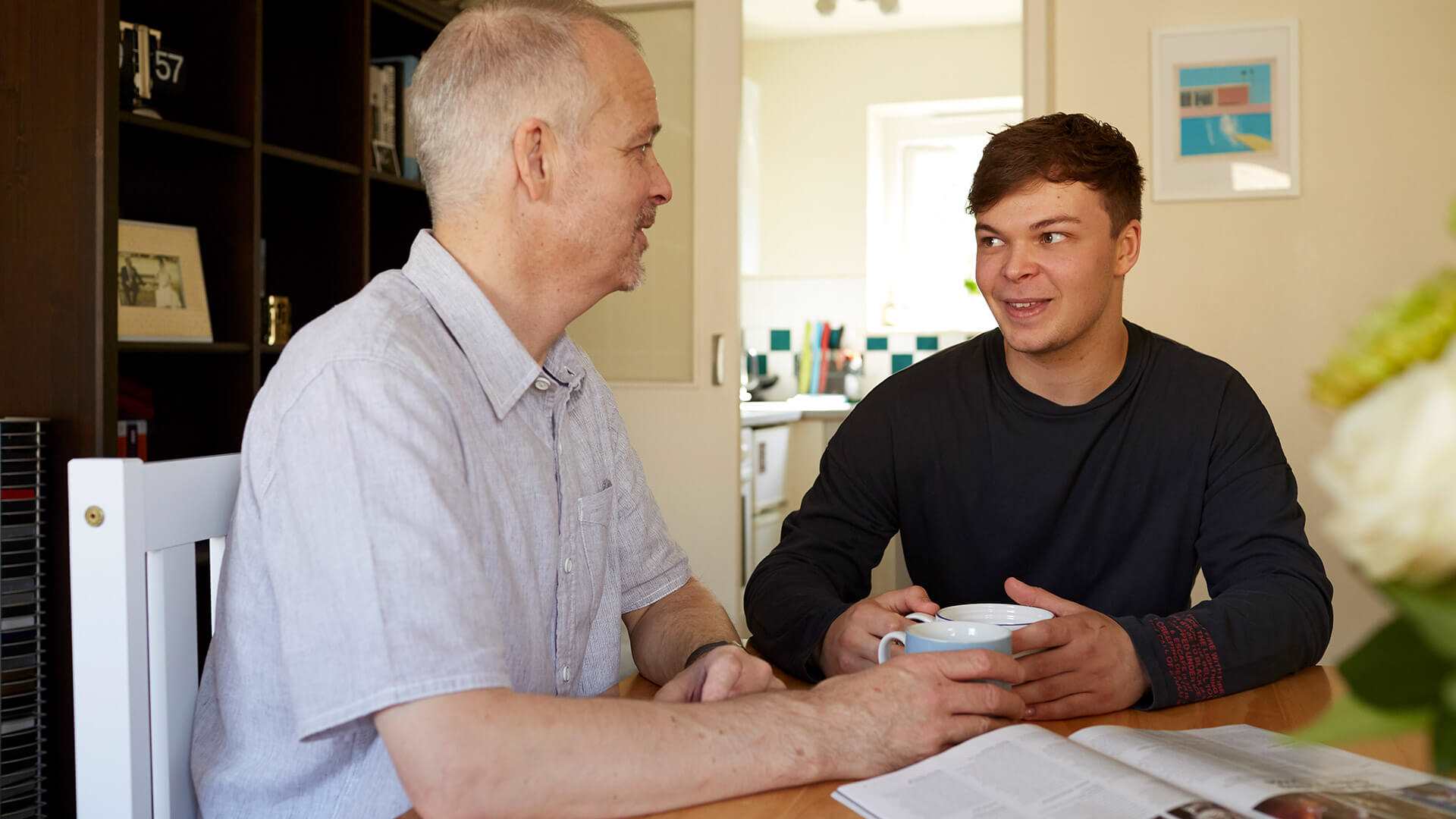
With rising bills, soaring energy prices and the cost-of-living crisis dominating the national conversation, it’s inevitable that many children and young people, just like adults, are worried about money.
Individual family circumstances vary widely, and the cost-of-living crisis will impact our wellbeing and finances differently. You may be feeling anxious about managing bills, low in mood, helpless, or worried about the impact on your own or your child’s mental health. Or perhaps you or your child feels isolated or lonely because of lack of money to socialise or do activities.
Whatever your situation, we can help. This guide has advice on taking care of yourself as well as looking after your child’s wellbeing and helping them manage worries about money. You’ll also find information about how to find practical and financial support for your family.
The links between money and mental health
It’s important to understand – and to help your child to as well – that feeling worried sometimes, particularly in response to difficult situations such as the cost-of-living crisis, is normal. It does not necessarily mean your child is unwell. But if these worries become overwhelming or persist for a long time, they could lead to a mental health issue such as anxiety or depression. A young person may also become isolated if they feel unable to cope with worries about money, or cannot afford to do things with family or friends. This, in turn, can have a negative impact on mental health.
While a young person’s mental health is not pre-determined by external events or context – such as their financial situation – experiences like poverty and social inequality can be a factor. Research (such as this by the Mental Health Foundation) shows this is a two-way relationship: poverty can increase the risk of mental health problems, and poor mental health can lead people into poverty. This can feel like a vicious circle, but this guide has tips and suggestions that can help.
Worrying about money or experiencing poverty might affect a young person’s mental health in a number of ways, including:
- anxiety or panic attacks triggered by bills, benefits assessments, debts etc.
- sleep problems
- social isolation or loneliness due to not having money to do things they enjoy
- depression caused by poor living conditions or being unable to afford necessities such as medications, counselling, adequate food or heating
- feeling stressed
- feelings of fear, shame, guilt (about any spending), being overwhelmed or having low self-esteem
If a young person has a mental health problem they may:
- lack motivation or feel unable to manage finances, budget or pay bills, so that debts or problems build up
- act impulsively, spending too much or making decisions they haven’t thought through
- be less able to study or work so that income reduces
- incur extra costs e.g. transport, therapy, medication, care or higher domestic bills due to being at home
Are young people worried about money?
We conducted research in August 2022, before the recent fuel cost and interest rate rises. All of this data is from these reports (Youthsight for YoungMinds Movement for Change report, January 2022; Beano Brain survey for YoungMinds, August 2022).
-
The cost of living was the major worry for over half (56%) of young people (rising from from 50% in May 2022). They reported disruption to daily life, particularly their diet and sleep.
-
Those aged 20-25 were particularly likely to feel concerned about money, with 80% always or often worried about earning enough.
-
This isn’t confined to older children: 21% of 11-year-olds said money worries had caused them stress, anxiety, unhappiness or anger.
How to deal with money stress
Money worries are a common source of stress and, particularly when combined with feelings of stress caused by other experiences, this can become overwhelming for you or your child.
This short video by Braive shows how this can happen and gives some suggestions to help manage stress.
How to talk to your child about money and the cost-of-living crisis
Parents often want to shield children, avoiding conversations about difficult situations. This is understandable, but silence can create space for worries to grow. Young people may be left to imagine worst-case scenarios, while feeling they can’t share those concerns with you. Even if you don’t feel you have answers, or know the full picture on how this developing situation will affect your family, it’s still better to say something than nothing.
You can find more advice on how to start conversations with your child about how they are feeling, and how to keep communication open, including activities for different ages, in our guide.
Here are some tips for talking to your child about money and the financial situation.
Let your child know they can ask questions or talk to you anytime as they think of things or as the situation develops.
They may feel embarrassed, awkward or resentful about having less money than peers. Tell them you understand this.
They may have friends or follow social media accounts that show things they can’t have. Perhaps they could look for accounts that celebrate other values or are less materialistic.
Try not to nag or judge, but talk to them about living within our means, thinking carefully about spending, and finding alternative ways to enjoy the things they value.
Talking the scenarios they are worried about through can help make their fears feel less abstract and overwhelming.
Young people sometimes blame themselves for pressures they are feeling, rather than seeing that they are caused by external forces. Focussing on what we can control is helpful for all of us.
It’s hard to get through to my kids that we can’t always afford what their friends can. My daughter looks at social media influencers with online ‘hauls’ and wants things. I guess we have to learn to say no a lot more.
Helping your child learn about the financial situation

Understanding a little about the wider situation causing the current focus on money worries, and how that has an impact on your family, might help reduce any resentment your child feels about making savings. It may also help them to see that this is an external force, and not one they can blame themselves (or another individual) for, or totally control.
Conversations about money and financial worries should be age- appropriate, and reflect your own family situation. So try to explain the cost-of-living crisis in terms your child can understand. For instance teenagers and older young people could relate its impact to the price of something they value, like a phone contract or rent payment, while a younger child might understand that they can buy less with their pocket money.
You could use free resources aimed specifically at young children, such as BBC Newsround or the Beano workbooks on financial literacy, created with the Bank of England. If your child is older you could watch or read the news together and talk about what you’ve learnt.
How to reassure your child if they are worried about the cost-of-living crisis
Children look to trusted adults for comfort when distressed. So while it’s good to be honest about what’s happening, and for them to see that it’s normal to sometimes feel worried or sad, it’s also important you are a reassuring presence. Worrying about being able to pay the bills is understandably very stressful, but trying to show your child that you are looking for solutions and are able to make some changes may reduce anxiety for them.
Money worries can also cause relationship tensions. Again, try to avoid projecting these onto your child. Relate has some great advice about managing tension over money within relationships.
Reassure them that we’ll be ok but have to pay boring but important bills first, that special treats like toys and eating out will have to go on hold.

Involving your children in cost-saving solutions
Focusing on practical steps you can take individually and together can make money problems feel more manageable. It can also increase feelings of empowerment and resilience for both your child and you. Having a sense of agency is beneficial for wellbeing – for adults and children alike. In addition, while these changes might feel small, they should still go some way to reducing household costs.
This could include small steps such as:
- switching appliances off when not needed
- wearing an extra layer to reduce central heating needs
- cancelling a subscription
- being creative with leftovers
- switching to cheaper brands.
Some ideas include:
- a family movie night or games tournament
- a visit to a free museum
- choosing books at the library
- making a homemade “takeaway” or trying a new budget-friendly meal, such as these from BBC Good Food.
We are trying to frame cutting costs as a positive in other ways too, so cutting back takeaways and pre-packaged food is better for the environment, which is something my children feel strongly about.
How to support your older or adult child through the cost-of-living crisis

If your child is a young adult they may be partially or completely financially independent, and they may live away from home. You may be worried about how they are coping with the cost-of-living crisis, but feel unsure how to talk to them about money or concerned about interfering with their independence.
Ask your child if they would like to talk about the situation. Reassure them that you are there to listen and can try to help them find solutions.
Older teenagers and young adults could make a budget. Writing down what is incoming and outgoing each month will help them develop a picture of their finances and be a useful reference if they need to look for practical support or benefits.
Childline have a guide to making a budget and organisations such as Citizen’s Advice have online budget tools.
My daughter and her boyfriend are moving into their first rented accommodation with friends soon. They do all their own cooking and we’ve talked about collecting all the supermarket coupons, fuel bills etc. She listens but she doesn’t seem as worried as me.
Taking care of your own wellbeing
The cost-of-living crisis is affecting families differently, with many facing serious hardship and fear. Whatever your situation, it’s important to look after your own wellbeing as well as your child’s. It’s much harder to support your child if you feel overwhelmed yourself.
We have more information and tips in our guide to looking after yourself.
-
Take time for yourself
Try to take some time for yourself, perhaps seeing a friend or going for a walk. Talking about your situation to someone you trust can help reduce isolation and anxiety, and identify solutions.
-
Keep routines
Keeping to healthy routines with diet and sleep is a good way to help look after your own wellbeing.
-
Manage stress
Focusing as much as possible on what you can influence, rather than events that are beyond your control, can help contain worries and make it easier to find a way through.
-
Limit news exposure
Feelings of anxiety or panic can sometimes be heightened by news or social media content, so while it’s good to keep up to date, it may help to limit your exposure if you feel overwhelmed.
-
Speak with a professional
If you are struggling with your mental health it's a good idea to make an appointment with your GP to discuss how you are feeling.
-
Get other support
Mental Health and Money Advice is an online service helping with understanding, managing and improving financial and mental health. It has suggestions for support groups and other ways to find help for yourself.
Where to find practical support
Asking for help when you are struggling can feel difficult, but remember it is a sign of strength. As well as helping you find practical assistance for your financial difficulties, reaching out can also reduce any feelings of hopelessness or isolation that you or your child may be experiencing.
It's a good idea to start with a written budget, so that you have a clear picture of your finances and can also use this in conversations with organisations that may be able to help, or in benefits assessments.
-
Citizen’s Advice has a budgeting tool and benefits calculator, as well as information on food banks, difficulties with rent and debts. Turn2us also has a benefits calculator and information on grants you may be eligible for and other sources of support.
-
Your local authority website should have information about emergency grants and organisations offering support in your area. The Government’s Help for Households site also lists information on benefits and support with costs such as childcare and transport.
-
If you are in debt it is best to ask for help, rather than letting bills and interest mount up. Banks and credit card companies can usually help to draw up repayment arrangements if they know you're struggling. The charity National Debtline has advice on how to do this, as well as template letters you can use.
Other support
For support and advice on specific needs that you may be struggling with financially, the following organisations may be able to help.
Find your local food bank through the Trussell Trust. See your local authority website for information about free school meals.
Ofgem’s guide to support sets out how your energy supplier can help if you’re struggling with gas and electricity bills. The Fuel Bank Foundation also has practical advice and offers emergency financial support.
You may be eligible for a grant of up to £200 to help with the cost of your child’s school uniform. Money Saving Expert has information.
End Furniture Poverty has a guide to finding furniture and white goods if you’re on a low-income.
Shelter offers advice and support with housing issues and homelessness, including one-to-one local support, online support, an emergency helpline and free legal support.
If you care for someone with a mental or other health condition or a disability, you may be eligible for financial support towards extra costs. Carers UK has information.
Useful helplines and websites
While we take care to ensure that the organisations we signpost to provide high quality information and advice, we cannot take responsibility for any specific pieces of advice they may offer. We encourage parents and carers to always explore the website of a linked service or organisation to understand who they are and what support they offer before engaging with them.
-
Citizens Advice
Provides information and advice on issues such as divorce and separation, benefits, work, universal credit, debt, housing and immigration.
Webchat service available.
If you're experiencing problems with debt, you can call their debt helpline or use their debt webchat service.
- Opening times:
- 9am - 5pm, Monday - Friday
-
Turn2us
Helps people in financial need gain access to welfare benefits, charitable grants and other help – online, by phone or face-to-face through partner organisations.
- Opening times:
- Monday - Friday, 9am-5pm
-
Family Lives
Emotional support, information, advice and guidance on any aspect of parenting and family life.
- Opening times:
- 9am - 9pm, Monday to Friday; 10am - 3pm at weekends
-
National Debtline
Information and advice on managing bills and debt, including debt management plans and council tax arrears. The charity offers template letters to use when contacting lenders and suppliers as well as a free helpline and webchat service.
0808 808 4000
- Opening times:
- Monday to Friday 9am - 8pm; Saturday 9:30am - 1pm
-
Shelter
Provides information and advice about housing and homelessness.
Webchat service available 9am - 5pm on weekdays.
Access local support and advice.
- Opening times:
- 8am - 8pm on weekdays, 9am - 5pm on weekends
You might also find helpful...
Whether you love the page or think something is missing, we appreciate your feedback. It all helps us to support more young people with their mental health.
Please be aware that this form isn’t a mental health support service. If your child is in crisis right now and you want to talk to someone urgently, find out who to contact on our urgent help page.
At YoungMinds we take your privacy seriously. If you’d like to read more about how we keep the information we collect safe, take a look at our privacy policy.



